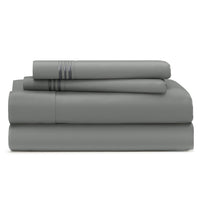
The Secret to Better Sleep After 45!
Since turning 45, have you felt like getting good quality rest is hard to come by? It’s not all in your head—science concludes that sleep disruptions become more common as you get older.[1]
The good news is that it doesn’t have to be all downhill from here!
Below, we’ll uncover how to set your nights up for a successful sleep. From understanding the mysteries of sleep changes that come with age to choosing the right type of bedding and building your perfect wind-down routine, your most restful sleep is right around the corner!
How Much Sleep Do You Actually Need After 45?
One popular belief is that older adults and seniors need less sleep than younger adults, but according to the experts, that isn’t true. In fact, adults 19-64 years need 7-9 hours of sleep.[2] So even if you’re in bed for that long but find yourself not feeling rested, it’s likely that you’re not getting as much deep sleep (REM), a common challenge that older adults face.

Why Does Sleep Get Harder After 45?
You settle in for the night and have no trouble falling asleep, but find yourself awake at 3 in the morning. From hormonal shifts to waking up too hot or too cold, there are all sorts of reasons adults 45+ struggle to get sound sleep.
REM sleep is the most crucial point of the sleep cycle for brain development, mental health, and a stronger immune system. Unfortunately, evidence indicates a decrease in deep sleep (REM) throughout normal aging.[1,3] There are also some additional reasons you might be experiencing disrupted sleep cycles:
Hormonal Changes
-
Perimenopause: The period that transitions women in their late 40s or early 50s from their reproductive years into menopause.
-
Menopause: The phase after perimenopause, when a woman has gone without a period for 12 months straight.
-
Andropause: After age 40, men’s testosterone levels tend to fall about 1% each year.
Temperature Dysregulation
-
Slower Metabolism: With age, the body’s heat production declines, even more so at night, causing you to feel too cold. Ironically, if your body can’t effectively warm itself, this can trigger a rapid heart rate and hot flashes.
-
Thinner Skin: As collagen, elastin, and fat layers degrade with age, there is less of a barrier, so it’s harder for the body to retain heat, which makes it more likely that the body will be more sensitive to temperature changes.
-
Altered Circulation: Blood flow slows and becomes less efficient with age, leading to cold hands, feet, and uneven body temperature during sleep.

Health Conditions & Medications[4,5,6,7]
-
Diabetes: Blood sugar dips at night or medications like insulin/SGLT2 inhibitors can cause night sweats or frequent urination.
-
Acid Reflux (GERD): Lying down worsens symptoms; nighttime coughing, hiccups, or discomfort can wake you up.
-
Insomnia: Some sleep aids to counteract insomnia cause rebound insomnia or reduce REM sleep over time.
-
Nocturia: Frequent nighttime urination can result from aging, prostate changes, or diuretics taken late in the day.
-
Arthritis: Joint pain or stiffness intensifies at night, and corticosteroids may also cause restlessness or insomnia.
-
Sleep Apnea: Undiagnosed apnea causes frequent night wakings due to breathing pauses, often mistaken for “light sleep.”
-
Depression: May cause early morning wake-ups; some antidepressants reduce REM or cause vivid dreams.
-
Anxiety: Racing thoughts or tension make it hard to fall/stay asleep; meds like Selective Serotonin Reuptake Inhibitors (SSRIs) or benzos can disrupt sleep patterns long-term.
Suggested Read: Sleepless & Sweaty? 5 Post-Menopause Secrets You Need to Know
The Link Between Heat Sensitivities & Overheating
As your body tries to wind down for sleep, your core body temperature naturally wants to decrease. However, if your body temperature remains elevated, this process becomes more difficult, and as a result, the sleep phases will be impacted, especially the ever-important N3 sleep (deep sleep).
As you read in the section above, aging naturally brings hormonal changes, disrupted thermoregulation, and an increased likelihood of developing age-related conditions. These conditions are often managed with prescriptions and have been connected with heat sensitivities and overheating.
If you have trouble falling asleep, toss and turn in the middle of the night, or wake up feeling tired, your poor sleep might be caused by heat.

How To Create A Sleep-Inducing Sleep Environment
Seeing all the reasons why sleep can get trickier after 45 might feel a little discouraging, but you're far from alone. The good news? With just a few thoughtful changes to your bedtime routine and sleep space, you can create a soothing sleep sanctuary that helps you rest more deeply, wake up feeling better, and support your overall well-being for the long run.
Why Temperature Awareness Matters
Our bodies naturally become less sensitive to temperature shifts as we age. So if you aren’t able to identify when your bedroom is too hot or too cold, you might have trouble sleeping. Here are some changes you can make to feel more comfortable:
Establish a Cool Sleep Environment
-
Keep your bedroom between 60-67°F for optimal sleep.[8]
-
Maintain proper airflow: Use a ceiling or box fan and incorporate blackout curtains to limit the amount of heat coming through the windows.
Invest in Temperature-Regulating, Natural Bedding
Inevitably, the material closest to your skin is the area that matters the most as you sleep. Fabrics like viscose from bamboo are naturally breathable and moisture-wicking, helping regulate temperatures and reduce night sweats.[9]
Want your sleep quality to soar? Cosy House’s luxury bedding is designed to keep your temperature stable throughout the night.
Here’s a rundown of the comfortable bedding essentials you should have on your bed:
-
100% Bamboo Bed Sheets: Unlock cool, breathable, and temperature-regulating comfort without sacrificing softness.
-
100% Bamboo Pillowcases: Prevent heat from getting trapped under your head with a moisture-wicking and silky smooth pillowcase that enhances comfort and reduces night sweats.
-
Luxury Down Alternative Comforter: Cozy without the bulk— this lightweight comforter is designed for a perfect balance of warmth and breathability.
-
Luxury Mattress Protector: Add an extra layer of cooling comfort and protect against common non-living household allergens and moisture buildup.
A Little Bit of Customer Love
We could go on about comfort and quality, but we think our customers say it best:
-
“My favorite sheets ever I now have 3 pairs”
— Sharon P., on our 100% Bamboo Bed Sheets -
“Absolutely the best quality in a comforter. It feels wonderful and cool on my skin.”
— Suzie T., on the Luxury Down Alternative Comforter -
“The quality is unmatched: the fabric is incredibly soft, breathable, and durable. Even after countless washes and regular use, the material stays smooth and never pills up. It feels just as luxurious as the first night I slept on them.”
— Brande, on our 100% Bamboo Pillowcases

Customize Your Perfect Sleep Ritual
Creating a personalized nighttime routine can help train your body to relax, restore, and rest more deeply. Small, thoughtful habits can make a big impact on how quickly you fall asleep, how often you wake up, and how refreshed you feel in the morning. Here are a few ways to support your best sleep, night after night:
-
Power down screens 30-60 minutes before bed to reduce blue light and support melatonin production.
-
For a spa-like sleep environment, use an ultrasonic diffuser with calming essential oils like lavender or eucalyptus.
-
Unwind with light movement or herbal tea like chamomile or lemon balm to ease into sleep.
-
Take a warm bath 1.5-2 hours before bed to help your core temperature drop naturally.
-
Stick to a consistent sleep schedule, even on weekends, to support aging circadian rhythms.
-
Limit caffeine and alcohol in the evening, as they can disrupt deep sleep.
-
Keep naps short and early, ideally 20-30 minutes, to avoid interfering with nighttime sleep.
-
Consider gentle supplements like melatonin or magnesium, with your doctor’s guidance.
Better Sleep is Possible, Age Is Just a Number
Just because you're over 45 doesn't mean you're destined for restless nights. Age is just a number, and with the right tools, habits, and sleep environment, you can enjoy deep, restorative rest well into your golden years.
From breathable bedding to smart sleep habits, every small step counts. Products like Cosy House’s bamboo pillowcases and sheets aren’t just indulgent—they’re scientifically designed to help regulate temperature, reduce night sweats, and maximize comfort.
Don’t settle for tossing and turning. Prioritize your sleep and wake up each day feeling truly rested, refreshed, and rejuvenated.
We've gone ahead & enclosed a 10% off coupon below for you to use if you'd like to take the plunge and try out our bedding for yourself! To shop our collection & get 10% OFF, use the code 'BLOG10' at checkout.
Resources:
-
Li, J., Vitiello, M. V., & Gooneratne, N. S. (2018). Sleep in Normal Aging. Sleep Medicine Clinics, 13(1), 1–11.https://pubmed.ncbi.nlm.nih.gov/29412976/
-
U.S. Department of Health and Human Services. (n.d.-a). How much sleep is enough?. National Heart Lung and Blood Institute. https://www.nhlbi.nih.gov/health/sleep/how-much-sleep
-
Stepnowsky, C. J., & Ancoli-Israel, S. (2008). Sleep and Its Disorders in Seniors. Sleep medicine clinics, 3(2), 281–293. https://pubmed.ncbi.nlm.nih.gov/19122865/
-
Barczi SR, Teodorescu MC. Psychiatric and medical comorbidities and effects of medications in older adults. In: Kryger M, Roth T, Goldstein CA, Dement WC, eds. Principles and Practice of Sleep Medicine. 7th ed. Philadelphia, PA: Elsevier; 2022:chap 191.
-
Padda IS, Mahtani AU, Parmar M. Sodium-Glucose Transport Protein 2 (SGLT2) Inhibitors. [Updated 2023 Jun 3]. In: StatPearls [Internet]. Treasure Island (FL): StatPearls Publishing; 2025 Jan-. Available from: https://www.ncbi.nlm.nih.gov/books/NBK576405/
-
Cole J. L. (2020). Steroid-Induced Sleep Disturbance and Delirium: A Focused Review for Critically Ill Patients. Federal practitioner : for the health care professionals of the VA, DoD, and PHS, 37(6), 260–267.
-
McCarthy, A., Wafford, K., Shanks, E., Ligocki, M., Edgar, D. M., & Dijk, D.-J. (2016). REM sleep homeostasis in the absence of REM sleep: Effects of antidepressants. Neuropharmacology, 108, 415–425. https://doi.org/10.1016/j.neuropharm.2016.04.047
-
Harding, E. C., Franks, N. P., & Wisden, W. (2019). The Temperature Dependence of Sleep. Frontiers in neuroscience, 13, 336. https://doi.org/10.3389/fnins.2019.00336
-
Tausif, M., Ahmad, F., Hussain, U., Basit, A., & Hussain, T. (2015). A comparative study of mechanical and comfort properties of Bamboo Viscose as an eco-friendly alternative to conventional cotton fibre in polyester blended knitted fabrics. Journal of Cleaner Production, 89, 110–115. https://doi.org/10.1016/j.jclepro.2014.11.011


